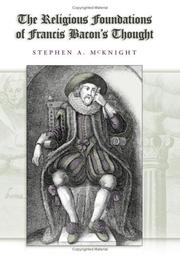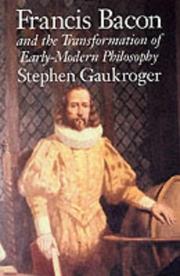| Listing 1 - 10 of 66 | << page >> |
Sort by
|
Book
ISBN: 1282975293 9786612975295 0739144839 9780739144831 9780739144817 0739144812 9781282975293 6612975296 Year: 2010 Publisher: Lanham Lexington Books
Abstract | Keywords | Export | Availability | Bookmark
 Loading...
Loading...Choose an application
- Reference Manager
- EndNote
- RefWorks (Direct export to RefWorks)
Francis Bacon's 'Inquiry Touching Human Nature' is an engagement at a fundamental level with the political and philosophic thought of one of the founders of modernity, Francis Bacon. Bacon had a comprehensive vision of the human situation. And because he saw the costs or dangers of modern life as clearly as he predicted its achievements and boons, Bacon is a thinker who addresses directly and deeply our own perplexities.
Bacon, Francis, --- Bacon de Verulam, François --- Bacon, François
Book
Year: 2017 Publisher: [Place of publication not identified] : Great Neck Publishing,
Abstract | Keywords | Export | Availability | Bookmark
 Loading...
Loading...Choose an application
- Reference Manager
- EndNote
- RefWorks (Direct export to RefWorks)
Book
Year: 2009 Publisher: Washington : Great Neck Publishing,
Abstract | Keywords | Export | Availability | Bookmark
 Loading...
Loading...Choose an application
- Reference Manager
- EndNote
- RefWorks (Direct export to RefWorks)
Features the text of "The Declaration of the People" by American colonial leader Nathaniel Bacon (1647-1676), provided by the Department of Humanities Computing at the University of Groningen in The Netherlands. Bacon's Rebellion was an uprising led by Bacon of Virginia farmers against English Colonial Governor William Berkeley (1606-1677).
Book
Abstract | Keywords | Export | Availability | Bookmark
Book
ISBN: 9781438454177 9781438454184 143845418X 1438454171 Year: 2015 Publisher: New York, N.Y. SUNY Press
Abstract | Keywords | Export | Availability | Bookmark
 Loading...
Loading...Choose an application
- Reference Manager
- EndNote
- RefWorks (Direct export to RefWorks)
Comprehensive in its ambitions and meticulous in its approach, The Political Philosophy of Francis Bacon is a new and unique interpretation of one of early modernity's more important thinkers. Whereas recent works on Bacon tend to confine themselves either to interpreting his historical context or to considering the founder of Baconianism from the perspective of one work in particular or the history of science in general, Tom van Malssen argues, through detailed and provocative interpretations of a number of Baconian writings, that the unity of Bacon's thought can only be revealed if these writings are read in historical and philosophical conjunction as well as on the assumption that they are all somehow part of the whole of Bacon's political philosophy. In addition to restoring Bacon to the pantheon of great philosophers, Van Malssen demonstrates that a proper understanding of Bacon's political philosophy contributes significantly to our understanding of the nature of philanthropic science, the modern project, and ultimately ourselves.
Political philosophy. Social philosophy --- Bacon, Francis --- Political science --- Political philosophy --- Philosophy. --- Bacon, Francis, --- Bacon de Verulam, François --- Bacon, François
Book
Year: 2012 Publisher: Project Gutenberg
Abstract | Keywords | Export | Availability | Bookmark

ISBN: 0826264999 9780826264992 0826216099 9780826216090 Year: 2006 Publisher: Columbia, Mo. University of Missouri Press
Abstract | Keywords | Export | Availability | Bookmark
 Loading...
Loading...Choose an application
- Reference Manager
- EndNote
- RefWorks (Direct export to RefWorks)
"Presents close analysis of eight of Francis Bacon's texts in order to investigate the relation of his religious views to his instauration. Attempts to correct the persistent misconception of Bacon as a secular modern who dismissed religion in order to promote the human advancement of knowledge"--Provided by publisher.
Philosophy. --- Mental philosophy --- Humanities --- Bacon, Francis, --- Bacon de Verulam, François --- Bacon, François --- Religion.

ISBN: 0521805368 0521801540 0511017782 1280430400 0511047614 0511173814 0511612680 0511302215 051115304X 1107122740 9780521805360 9780511612688 9780521801546 9780511017780 051103234X 9780511032349 9781107122741 9781280430404 9780511047619 9780511173813 9780511302213 Year: 2001 Publisher: Cambridge ; New York : Cambridge University Press,
Abstract | Keywords | Export | Availability | Bookmark
 Loading...
Loading...Choose an application
- Reference Manager
- EndNote
- RefWorks (Direct export to RefWorks)
This ambitious and important book, first published in 2001, provides a truly general account of Francis Bacon as a philosopher. It describes how Bacon transformed the values that had underpinned philosophical culture since antiquity by rejecting the traditional idea of a philosopher as someone engaged in contemplation of the cosmos. The book explores in detail how and why Bacon attempted to transform the largely esoteric discipline of natural philosophy into a public practice through a program in which practical science provided a model that inspired many from the seventeenth to the twentieth centuries. Stephen Gaukroger shows that this reform of natural philosophy was dependent on the creation of a new philosophical persona: a natural philosopher shaped through submission to the dictates of Baconian method. This book will be recognized as a major contribution to Baconian scholarship, of special interest to historians of early-modern philosophy, science, and ideas.
Bacon, Francis --- Bacon, Francis. --- Philosophy, Modern. --- Philosophy, Modern --- Philosophy & Religion --- Philosophy --- Bacon, Francis, --- Philosophy. --- History. --- Bacon de Verulam, François --- Bacon, François --- Modern philosophy --- Arts and Humanities
Book
Year: 2003 Publisher: Manchester University Press
Abstract | Keywords | Export | Availability | Bookmark
 Loading...
Loading...Choose an application
- Reference Manager
- EndNote
- RefWorks (Direct export to RefWorks)
The New Atlantis has fired the imaginations of its readers since its original appearance in 1627. Often regarded as the apotheosis of Bacon's ideas through its depiction of an advanced 'scientific' society, it is also read as a seminal work of science fiction. Standing at the threshold of early modern culture, this key text incorporates the practical and visionary, utility and utopia. This volume of eight new essays by leading scholars provides a stimulating dialogue between a range of critical perspectives. Encompassing the fields of cultural history, history of science, literature and politics, the collection explores The New Atlantis' complex location within Bacon's oeuvre and its negotiations with cultural debates of the past and present. Contributors consider the book's use of rhetoric, its narrative contexts, its political and ethical implications, its relation to the natural knowledge of the period, and the function of miracles in New Atlantan society. The politics of colonialism and Jewish toleration, its complex representation of gender, and the role and politics of censorship are also explored. This volume will be the ideal companion to Bacon's The New Atlantis and for all students of literature, politics, history, cultural history and history of science.
English literature --- History and criticism. --- Bacon, Francis, --- literature --- bacon --- atlantis --- Bensalem Township --- Pennsylvania --- Francis Bacon --- New Atlantis --- Salomon's House --- Utopia
Book
ISBN: 1282602748 9786612602740 9047442318 9789047442318 6612602740 9789004170506 9004170502 Year: 2008 Publisher: Leiden Boston Brill
Abstract | Keywords | Export | Availability | Bookmark
 Loading...
Loading...Choose an application
- Reference Manager
- EndNote
- RefWorks (Direct export to RefWorks)
The essays in the present volume attempt to historically reconstruct the various dependencies of philosophical and scientific knowledge of the material and technical culture of the early modern era and to draw systematic conclusions for the writing of early modern history of science. The divisive transformation of humanist scholarly culture, the Scholastic school philosophy, as well as magic in the form of a philosophy of practice is always associated with the work of Francis Bacon. All of these essays in this volume reflect the close interaction between technical models and knowledge production in natural philosophy, natural history and epistemology. It becomes clear that the technological developments of the early modern era cannot be adequately depicted in the form of a pure history of technology but rather only as part of a broader, cultural history of the sciences. Contributors include: Todd Andrew Borlik, Arianna Borrelli, Thomas Brandstetter, Daniel Damler, Luisa Dolza, Moritz Epple, Berthold Heinecke, Dana Jalobeanu, Jürgen Klein, Staffan Müller-Wille, Romano Nanni, Jarmo Pulkkinen, Pablo Schneider, Andrés Vaccari, Benjamin Wardhaugh, Sophie Weeks, and Claus Zittel.
Mechanik. --- Naturwissenschaften. --- Technik. --- Technischer Fortschritt. --- Technology --- Applied science --- Arts, Useful --- Science, Applied --- Useful arts --- Science --- Industrial arts --- Material culture --- Technology and civilization --- History --- Philosophy. --- Bacon, Francis. --- Bacon, Francis, --- Bacon de Verulam, François --- Bacon, François
| Listing 1 - 10 of 66 | << page >> |
Sort by
|

 Search
Search Feedback
Feedback About UniCat
About UniCat  Help
Help News
News